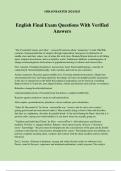©BRAINBARTER 2024/2025
English Final Exam Questions With Verified
Answers
"The Twentieth Century and After" - answer✔Confusion about "modernity" in mid 19th/20th
centuries. Expansion/decline of empires through imperialism, bourgeois revolution/rise of
middle class and their values, rise of urban life with cities. Modern Britain believed its all falling
apart, skeptical irresolution, and in a hard/dry world. Traditional stabilities weakening/pace of
change accelerating/mass dislocations of populations/mixing of cultures and classes/cities.
New concepts. Freud/psychoanalysis: unconscious mind. Frazer/anthropology: concepts of
culture/myth. Nietzsche/philosophy: truth, morality and God are just constructs.
Artistic responses: Reaction against middle class Victorian attitudes/conventions. Skepticism-
mistrusted positivism, not being optimistic that things will turn out alright/scientific uncertainty
in the face of change but its the belief that empirical explanation can be found in everything.
Impressionism in visual arts, post impressionism, cubism and futurism (not realistic or romantic).
Relentless change/loss/destabilization/
experimental/pessimism. Personal/textual inwardness, complexity/difficulty.
Reaction against moderism- return to realism/moralism.
After empire- postmodernism, pluralism, various realisms, post colonialism.
"Dulce Et Decorum Est" by Owen - answer✔In war, "sweet to die for one's own country",
getting gassed and one man doesn't make it. Man actually dying in front of him and describes
that later as a nightmare, describes his painful death. At the end refuting the Pope's idea that it is
good to enlist, saying you would rethink it if you knew what was actually going on.
"Tradition and Individual Talent" by Eliot - answer✔Part 1: Individual poets and literary
tradition. Novelty vs. engage tradition. Balance- don't repeat exactly, do have a "historical
sense". Knowledge- "the poet must develop/procure the consciousness of the past and he should
continue to develop this consciousness throughout his career." Present/past poets are defining- no
poet has complete meaning alone, compare and contrast with the dead, aesthetic and not merely
historical.
Part 2: Science- filament of platinum, oxygen and sulfur dioxide results in sulfurous avid.
Poetry- mind of the poet, experience and medium/combination, results in poem. The catalyst
, ©BRAINBARTER 2024/2025
analogy triggers chemical change not affected by the reaction. The platinum/poet's mind are
catalysts. Platinum must be present, sulfurous acid contains no trace of platinum. Poet's mind
must be the present, poem contains no trace of poet.
Poet as man experiences emotions and suffers. Poet as poet creates (passions of
element/material) and makes poetry. Ordinary emotions in new combinations. Says that
Wordsworth gets this wrong. Not emotion, tranquility, recollection, meditation, conscious, with
deliberation- instead it is a concentration of experiences and a new thing results. Poetry is an
escape from emotions/personality.
Part 3: Practical, interest in poetry and not poet, emotion of art is impersonal, poet surrenders
himself to work, conscious of past in present movement.
"Hollow Men" by Eliot - answer✔Begin with two epigraphs, from Heart of Darkness and a
phrase of children who want money to buy fireworks to celebrate Guy Fawkes Day. Narrated by
one of the Hollow Men. Leaning together like dry scarecrows, everything is meaningless, they
live in a state like hell except they are too cowardly to commit the tasks that would get them into
either heaven or hell, can't cross over. One can't look at those who have made it to "death's dream
kingdom" (heaven/hell) and say prayers to broken stones. Describe vacant, desolate surroundings
and is afraid to look at people. Last section ends with ring around the mulberry bush nursery
rhyme, except children are playing around a cactus, they are paralyzed. Starts off with "life is
very long" and "for thine is the kingdom" which turns into the end of the world. End of the world
is a sad and quiet whimper.
"Easter" by Yeats - answer✔Talks about people he meets and has meaningless interactions with,
then goes through all the people who were involved in the Easter Uprising of 1916 (woman and
some other guys who would have had bright futures if they hadn't been executed for treason, one
man who had hurt people close to him), but wonders if these people might have actually been
heroes. Compares fighters and unchanging dedication to a rock at the bottom of a stream. He
isn't sure how much he admires these individuals but he respects them and the sacrifices they've
made for what they believe in. Repeats "a terrible beauty is born" to mean that even though these
deaths are terrible history remembers the bloody battles and self sacrificing more than anything
else. Terrible beauty that comes out of death. Nationalists- "was it all worth it" and anti
nationalists "he glorifies martyrs" (neither like it).
"Second Coming" by Yeats - answer✔Begins with image of a falcon flying out of earshot of its
master, which represents the collapse of traditional social arrangements in Europe. Poem shifts
into description of "anarchy" and an orgy of violence where the "ceremony of innocence is
born", says that only bad people have any enthusiasm. Speaker takes the violence which has
engulfed society as a sign that the "Second Coming" is at hand and imagines a sphinx in a desert
(we are meant to think that this mystical animal instead of Christ is coming to fulfill the
prophecy from the Book of Revelations). "The darkness drops again" but the speaker remains




